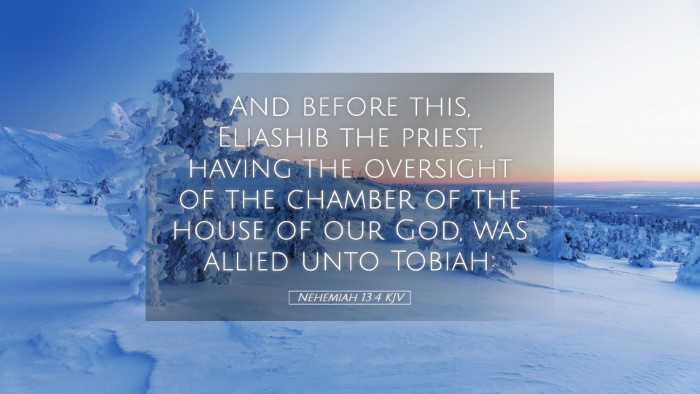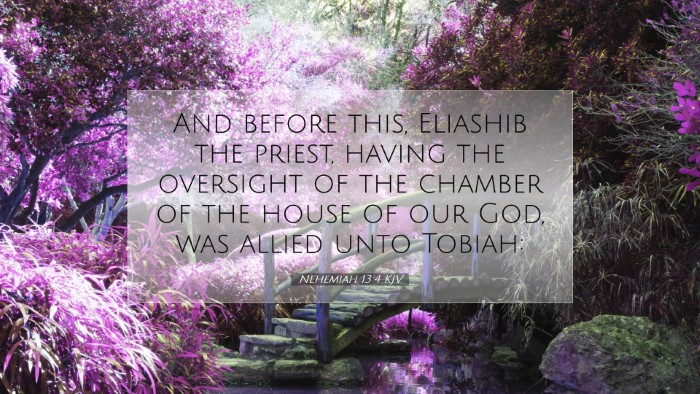Commentary on Nehemiah 13:4
Nehemiah 13:4 states:
“And before this, Eliashib the priest, having the oversight of the chamber of the house of our God, was allied unto Tobiah.”
Contextual Background
The setting of this verse occurs after Nehemiah's return to Jerusalem, where he observes various issues that had arisen during his absence. This particular verse introduces a significant character, Eliashib the priest, and highlights the troubling alliances that had formed within the leadership of Israel.
Commentary Insights
Albert Barnes' Commentary
Barnes emphasizes that Eliashib, as a high priest, should have maintained the sanctity of the Temple and the purity of worship. However, his alliance with Tobiah, an enemy of the Jews, represents a grave failure in judgment and leadership. Barnes notes that this alliance reflects a broader issue of compromise that had infiltrated God’s people, where personal relationships compromised spiritual integrity.
Matthew Henry's Commentary
Henry provides a vibrant examination of Eliashib's conduct, portraying him as someone who forsook his sacred duty for personal gain or friendship. He suggests that this act was indicative of a lamentable trend where leaders, despite their calling, sought favor with the ungodly rather than adhering to God’s commands. Henry warns that this kind of alliance leads to the dilution of spiritual zeal and faithfulness among God's people.
Adam Clarke's Commentary
Clarke notes the historical and cultural implications of Eliashib's actions. He observes that Tobiah, being an Ammonite, was part of the very nations that the Israelites were warned against mingling with. Clarke points out that Eliashib's decision to associate closely with Tobiah puts into question the integrity of the leadership within the Jewish community, illustrating that even those in positions of spiritual authority can falter in their covenant loyalty to God.
Theological Implications
- Spiritual Compromise: This verse serves as a rich study in the dangers of spiritual compromise. Leaders must be wary of forming alliances that can lead to moral and spiritual erosion.
- Faithfulness in Leadership: The text calls for a reflection on the commitment of leaders to uphold the teachings of scripture and protect the sanctity of their roles in guiding God’s people.
- Historical Context and Its Relevance: Understanding the alliances during Nehemiah’s time provides insight into how contemporary believers must navigate similar challenges in maintaining their faithfulness amidst societal pressures.
Lessons for Today
This verse is a cautionary tale that remains relevant in today's context. It serves as a reminder for pastors, theologians, and believers of the importance of vigilance against influences that may seek to undermine the purity of their worship and commitment to God.
The interactions and decisions of church leaders have far-reaching impacts on their congregations. Eliashib's failure invites contemporary leaders to consider their associations and evaluate whether they uphold or undermine the mission of the Church.
Conclusion
In conclusion, Nehemiah 13:4 encapsulates a vital lesson in leadership and spiritual fidelity. Both historical and modern readers are encouraged to seek divine wisdom and remain steadfast in their commitment to God’s standards. The oversight Eliashib exercised over the temple emphasizes the necessity of integrity in all areas of ministry and the ongoing need to discern righteous and unrighteous alliances.


